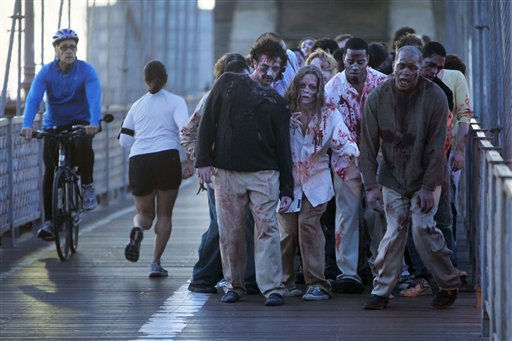Halloweek, Day Three: The Weird Nostalgia Of Zombies
Halloween Night will feature the premiere of "The Walking Dead," which will no doubt scare the crap out of millions of people. Just from the trailer, it looks fantastically engaging and well-made.
AMC is going all out to promote the show, including sponsoring a "zombie invasion" that hit several U.S. cities yesterday.
AP Photo/Seth Wenig
The Zombiepocalypse still ranks as one of our most persistent nightmares, and shows no signs of dying — Ha! Wordplay! — any time soon. All the other apocalypses waiting in the wings still can't match the terror and spectacle of the idea of the dead rising to feed on the living.
But I'm struck by the shift in tone in the tales of the zombie hordes these days. George Romero's Night of the Living Dead was an intense, moody, claustrophobic film. The ghouls were a relentless tide against the humans stuck in the house, and the film's stark black-and-white matched the inevitable conclusion of death and despair. Put simply, nobody was having any fun inside the movie.
That changed with Sam Raimi's bleakly funny Evil Dead 2. The Deadites in that movie might have been ravenous beasts of a hellish necroworld out to devour the flesh and souls of the living — but that didn't mean they weren't occasionally hilarious. And the fact that they were defeated by a retail clerk with a chainsaw was a pretty cheerful sign. It said the Zombipocalypse might be lethal, but it would at least be interesting.
That's part of the reason I love two of my favorite zombie stories, World War Z and Zack Snyder's remake of Dawn of the Dead. Both WWZ and DOD get weirdly and deeply specific about spread of the plague, like a PowerPoint on vectors of zombie infection from the CDC.
There's also something inconsequential about all the zombie hordes. In DOD, I was terrified for the safety of a dog sent as a messenger through a crowd of the undead — but laughed out loud at the survivors driving golf balls at the undead heads in that same crowd. This might be due to the fact that I'm just kind of a sick bastard, but I know I wasn't alone when I was laughing. As in Shaun of the Dead, the zombies are meant to be shuffling targets; you could do whatever you wanted to them. (Only in Romero's movies, as cheesy as they can be, do I get an idea of the undead as victims who are as unlucky as the human survivors.) It's Us vs. Them at its most basic.
There's a weird kind of hope in the zombie movies as well. It's almost like a sigh of relief once the planet has been wiped nearly clean of humanity; as if we can look at Armageddon finally arrived and say, "Well, thank God that's over." Another imperfect metaphor: it's like ripping off the band-aid in one quick swoop. Sure, it's painful, but it beats hell out of that slow, torturous peeling. And hey, look — underneath, that's fresh clean skin. My friend Glenn pointed out I Am Legend — which features Will Smith roaring down the deserted streets of Manhattan in a brand-new Mustang — actually makes being the sole survivor of the end of the world look sort of fun. In World War Z, the planet is inarguably better off after the zombie war — everyone is a little sadder but wiser and more compassionate. There's even cream soda in the new world, so it's not all bad news. It's the idea of a fresh start after a horrible, lingering illness — that just happened to end with rotting corpses walking around chomping on friends and neighbors.
There's a lot of this sentiment mirrored in our culture right now. People talk about a coming revolution, or the attack of the New World Order, with teeth bared in a too-wide smile, as if they can't wait for the shit to finally hit the fan. It's an understandable impulse. When things are uncertain and scary, it feels good to have an identifiable, clearly evil enemy.
But it seems like that's yesterday's news in zombie evolution now.
I've read the first volume of Robert Kirkman's The Walking Dead, on which the AMC series is based. I admit, I'm not very far into the book, and haven't even seen the show yet, but it seems different, despite all it has in common with its predecessors. Unlike previous zombie tales, there's no joy in smashing zombie skulls; one of the infected is even allowed to turn quietly in a hopes of a kind of reunion with his undead family. There's also no real joy in the rebirth of the world. Everyone looks around at the ruins of civilization with the dazed expression of a driver after a car crash. The protagonist, Rick, a former small-town sheriff, is a perfect lens to view the end of the world. Decent and pragmatic and uncommonly brave, he focuses on what's in front of him. Most important, he is resigned to the fact that the old world is gone and it's not coming back.
That's the thing I feel most strongly when looking at the abandoned skyscrapers, the dead tank in the city streets, the discarded and empty cars on the road: regret. The dead might be up and walking, but this world is still in mourning. And I can't help but wonder what that says about us, right now. I wonder what it means that we're already rehearsing the funeral for the world where we live.













